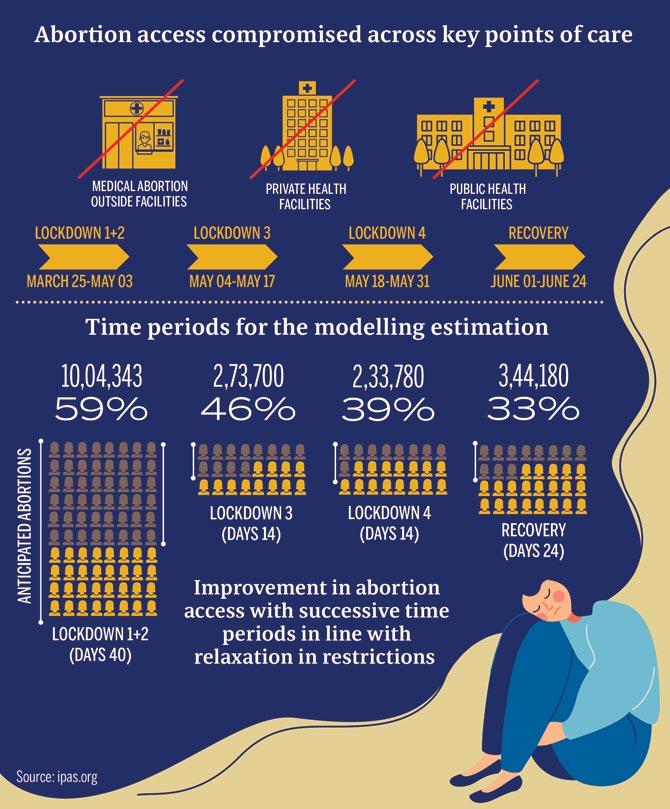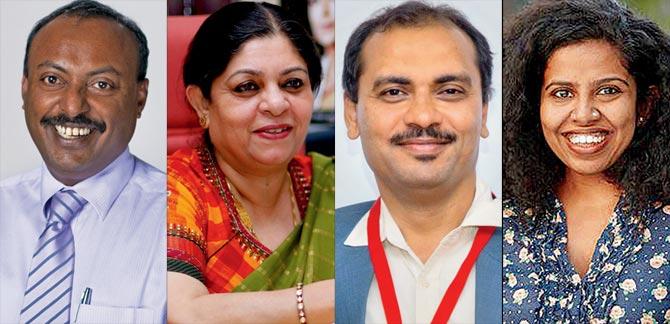A recent study looks at the number of compromised abortions in India during the first three months of lockdown, drawing attention to how women-s healthcare has suffered due to COVID-19

According to Ipas Development Foundation (IDF), India-a non-profit dedicated to preventing and managing unwanted pregnancies-47 per cent of the estimated 3.9 million abortions that would have likely taken place in India during the first three months of th
When Sujata Kharat missed her period by 15 days in March, she went to a local gynaecologist in Chembur-s Siddharth Nagar. After being told she was expecting a baby, the 33-year-old mother of two sons decided to terminate the pregnancy. She was prescribed Medical Abortion MA pills. "After medication, I began experiencing cramping and bleeding, which lasted for over 12 days. I knew it wasn-t normal. Something had gone wrong. After another appointment with the doctor, I realised that I-d had an incomplete abortion," homemaker Kharat recalls. Without losing more time, she had to now go for a surgical abortion. But, the nationwide lockdown was in effect. "By end of April, I thought I would be forced to continue with the pregnancy."
ADVERTISEMENT
According to Ipas Development Foundation IDF, India—a non-profit dedicated to preventing and managing unwanted pregnancies—47 per cent of the estimated 3.9 million abortions that would have likely taken place in India during the first three months of the COVID-19 lockdown [March 25 to June 24] were possibly compromised. A modelling study conducted by Ipas, which concluded in May 2020, states that 1.85 million Indian women could not terminate an unwanted pregnancy. Eighty per cent of these can be attributed to decreased sales of MA drugs at pharmacies. "In our study, we estimated a sharp decrease in the sale of MA drugs. This problem can be attributed to a temporary disruption in the supply chain. While the material may have been with the distributer, there was a problem in the consignment reaching the chemist," says Vinoj Manning, CEO, IDF.

Graphic/Uday mohite
He speaks of a woman from rural Jharkhand who wanted to terminate her pregnancy because she was a mother of four, but was forced to carry the child. "Basically, we violated her right to abortion," Manning adds.
Kharat, however, got lucky. Dr Shirish Malde, president, Family Planning Association of India, Mumbai branch, says, "She [Kharat] came to FPA-s Avabai Wadia Health Centre in Chembur, where we surgically removed the foetus. Just like Kharat, we got three more patients who had an incomplete abortion [failure to remove or expel all of the pregnancy tissue from the uterus] during the lockdown. Out of desperation, they had either taken pills without supervision or the procedure of oral intake of the medicines had gone horribly wrong."

Vinoj Manning, Poonam Muttreja,Dr Shirish Malde and Jasmine George
The Family Planning Association of India is a premier civil society organisation delivering essential health services that focus on sexual and reproductive health. The doctors attached to it claim that not a single woman was refused an abortion during the lockdown. "Our facility was shut only for the first 15 days; we reopened our centres on April 12. However, most private and BMC hospitals had stopped abortion procedures or limited them because the facilities have been converted into COVID-19 care centres and staff have been redirected from specialised duties to Coronavirus related work" Dr Malde says.
Another report by the Foundation for Reproductive Health Services India estimates that the pandemic could lead to an additional 8,34,042 unsafe abortions and 1,743 maternal deaths. "Of the estimated 15.6 million abortions that happen in India annually, five per cent are through traditional unsafe methods. These unsafe abortions are done by inserting dangerous objects into the vagina or anus. This could result in increased mortality or morbidity among pregnant women," Manning warns.
On realising the problem, India declared safe abortion as an essential health service on April 14, when the country was still under lockdown. Not much, however, changed on ground. Jasmine Lovely George, founder, Hidden Pockets, a Bengaluru-based platform for sexual and reproductive health services in India, says, "After every natural disaster, sexual and reproductive health services are rarely treated as essential in our country. So, we weren-t surprised when the Indian government did not include it in their first list of essential services after the lockdown." Hidden Pockets began in 2015 as a mapping project to identify non-judgmental medical facilities for women to seek abortion. They also run a careline, which connects pregnant women to abortion clinics. "Ours is a real-time service as our clients can chat with counsellors on WhatsApp. We saw a sudden spike in the number of calls during the lockdown. We received about 40 messages per day throughout April, till mid-May. Most of these came in from Tier 2 and 3 cities like Nashik, Bhubaneshwar, Puducherry, etc. Initially we were wondering how and later realised that the working population had gone back to their hometowns. They knew of Hidden Pockets as they had worked in big cities before the pandemic," George adds.
Most of the messages that Hidden Pockets received in March were from women in their first trimester, 18 to 28-year-olds who couldn-t leave home.
In the last five years of working with abortion clinics across the country, George says Kerala state has been the most problematic. "Several doctors in Kerala refuse to provide abortion services to single women in the absence of a parent. We had a case in the first week of April, when a 25-year-old woman wanted to terminate her pregnancy, and had to run between eight clinics," George says.
Poonam Muttreja, executive director, Population Foundation of India PFI, an organisation that works for the upliftment of underprivileged women, says, "The UNICEF, too, had forecast that the highest number of births during a nine-month pandemic period would take place in India. This will happen mostly in small towns and rural areas as frontline healthcare workers including ASHAs and ANMs, who were primarily engaged to service women-s healthcare and reproductive health, have now been pressed into COVID-19 service."
Indian law on abortion
Abortion has been legal in India since 1971 with the introduction of the Medical Termination of Pregnancy Act. According to the law, a pregnancy may be terminated by a registered medical practitioner if continuance of the same would cause grave injury to the physical or mental health of the woman or if there is great risk that the child would be born with severe physical or mental abnormalities. In late January 2020, the Union Cabinet amended the 1971 Medical Termination of Pregnancy MTP Act, raising the upper limit of MTP from 20 to 24 weeks for women including rape survivors, victims of incest, differently-abled women and minors. Failure of contraception is also acknowledged and MTP is now available to "any woman or her partner" replacing the old provision for "only married woman or her husband." As per the amended bill, a pregnancy may be terminated within 20 weeks with the approval of just one doctor, while two would be required for abortions between 20 and 24 weeks of pregnancy.
The rare judgement
The Bombay High Court in June permitted an unmarried woman to terminate her over 23-week pregnancy, observing that giving birth to a child out of wedlock could cause her mental and physical anguish. The Medical Termination of Pregnancy MTP Act prohibits termination of pregnancy beyond 20 weeks. A bench of Justices SJ Kathawalla and Surendra Tavade in an order also took note that the 23-year-old woman, a resident of Maharashtra-s Ratnagiri district, failed to undergo pregnancy termination within the 20 weeks permissible limit "mainly because she could not consult" a doctor in time due to the Coronavirus-enforced lockdown. The bench permitted her to undergo the procedure at a medical facility of her choice.
Catch up on all the latest Mumbai news, crime news, current affairs, and a complete guide from food to things to do and events across Mumbai. Also download the new mid-day Android and iOS apps to get latest updates.
Mid-Day is now on Telegram. Click here to join our channel @middayinfomedialtd and stay updated with the latest news
 Subscribe today by clicking the link and stay updated with the latest news!" Click here!
Subscribe today by clicking the link and stay updated with the latest news!" Click here!






